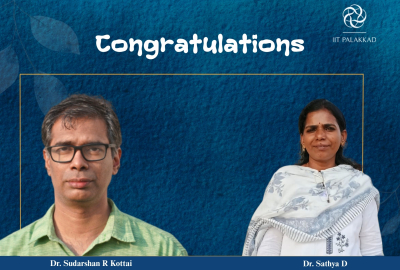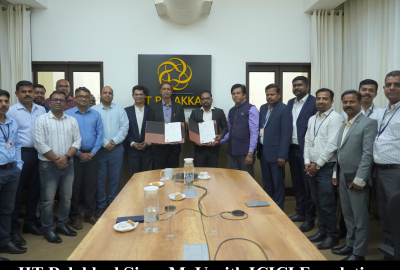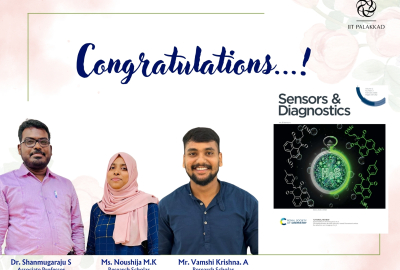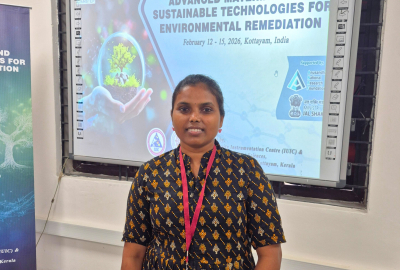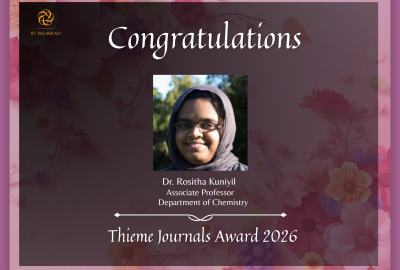
Day 4 of Science Quest-II & CRYSTAL: savouring Humanities & ESSENCE
On May 7 the residential science camp for school students entered its 4th Day. The first session for the day had Dr Anoop George engage the senior batch with ‘Science and Philosophy: An Introduction’, while Research Scholars Ms. Naseera and Ms. Catherine facilitated a session on ‘The Science of Language’ for the junior students.
Dr Anoop began by encouraging thinking on, and outlining the difference between science and philosophy: Knowledge of the physical world and natural laws v/s study of ideas and beliefs and meaning of life. The etymology of ‘Philosophy’ from Greek Philo – love and Sophia-wisdom and the two primary methods of using rationality to find the truth – through (1) argumentation and dialogue and (2) observation and the scientific method/hypothesis testing, showed how both philosophy and science are formalised attempts to understand the world. Science began in philosophy with Aristotle 2350 years ago, and stayed there for 2000 years as ‘Natural philosophy’. Drawing out how the goal, methods and means of evaluation showed both differences and commonalities between the two. Between science’s quest for ‘definite knowledge’ and theological dogma, philosophy is that which helps create our own understanding of both. Probing students for as well as providing examples of questions that neither Science not Theology can answer, Dr Anoop then dwelt on different types of philosophy, the subdivisions within them, and the contributions of Socrates (Socratic method) and Plato (Realism) with interesting videos and discussion around them. Plato’s ideas that that which is ‘real’ will endure, of ‘essence’ of material objects, and not their materiality, as being what is ‘real’; and the problem of knowledge or epistemology sparked a lot of questions from students and discussions around it.
The parallel session on the ‘Science of Language’ pitched for how to think of science and language in similar ways. One way to do so is by thinking of ‘structure’. Just as atoms and molecules are the smaller units of matter, students were encouraged to think of the smallest unit of language – sound, as well as constituent units: sounds, words and sentences. The concept of a proper word order, which is usually subject-verb-object in English and subject-object-verb in most Indian languages was discussed. The session introduced students to a lot of phonetic symbols, and discussed it’s application in technologies like Ultrasound and MRI . It’s relevance to not only linguists but also those in other fields like speech pathologists, engineers who work on voice recognition software, and forensic scientists was discussed. Within the same language, differences in speech patterns, the social influences on speech, contributions of language theorists like Noam Chomsky and others, were touched upon. Language puzzles that encouraged pattern recognition within diverse and unfamiliar languages, and games and a quiz using audio inputs to demonstrate the concepts discussed, all made for a fun, interactive and well-received session.
Dr Sunitha Nayar of ESSENCE then engaged all the students in a session titled ‘Thoughts are the seeds of your future’. Describing the work of IIT’s Environmental Science and Sustainable Development Centre as ‘Trying to work on making the world a better place to live’, she contended that the student’s generation is very special. She expressed the hope that theirs would be the first generation to eradicate poverty from the world, citing 2015 UN statistics that claims that secondary education access is now at 90%, and suggesting that that would help leverage people out of poverty. She also remarked that theirs was probably the last generation that could undo climate change. Sea water ingress on beaches was one indicator she suggested to keep track of climate change. Stating we were in the midst of earth’s 6th mass extinction, she introduced Sir David Attenborough’s work and recommended web-based resources to continue to follow his work. A video on the world’s disappearing biodiversity was played, its key messages were: 96% of the mass of mammals on the earth today are humans, 70% of all birds are domesticated poultry. We break nature’s connections at our peril. Yet break them we do, under the impact of our population and consumption. Nature once determined how we survive, now we determine how nature survives.
The anthropocene, human beings changing the course of life on earth, movies that had discussed concepts like credit cards (‘The Man from the Diner’s Club’) and mobile phones (Star Trek) which helped make fiction into reality, and a poem by Vayalar called for earth’s stewardship by humans, were all discussed. Stephen R Covey’s quote “Response-ability is the ABILITY to choose out response to any circumstance or condition” was used to introduce the 3 R’s – reduce, reuse and reycle. Reduce means buy less, choose well, make it last. Plastic is not bad, single use plastic is. Material and energy considerations make glass and paper grocery bags unsustainable. Discussing the pairs of footwear that people own, she urged simple change in lifestyle with consideration for consumption and materials used. Reusing container lorry parts for housing and recycling as value adding process, moving from a linear economy to a circular one and Systems thinking were other ideas that she shared. Concluding with “Choose right, choose well. You have the power”, she recommended that students read Sapiens and watch Zootopia.
Amit Kushwaha (Res.scholar) and Biswa Bhusan Satpathy (M.Tech Student) then dealt with the topic “Climate change and society”: The difference between weather and climate. Climate parameters, mapping climate change from 1880 to the present, the phenomena of extinction, the science of global warming, the role of fossil fuels in accelerating global warming and the impact of deforestation were all examined. A 4 degree rise in average global temperature is predicted by 2100 and how going beyond a 1.5 degree rise from pre-industrial levels would already mean a tipping point for the world as we know it, was a key message.

